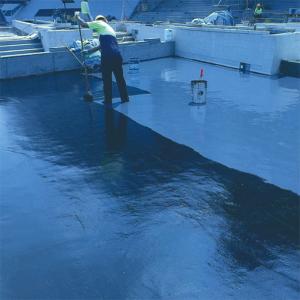

Add to Cart
Roof waterproofing is a vital aspect of building protection. Being constantly exposed to the elements, such as wind, sun, and fluctuating temperatures, without proper waterproofing, roof cracks and leaks can pose a threat to housing safety and affect the lifespan of a building.
Polyaspartic polyurea is an ideal new eco-friendly material for rooftop waterproofing. Known for its "skin-like" waterproofing ability, it's favored for its exceptional weatherability, aesthetic appeal, and elasticity to resist cracking. To fully harness the benefits of this outstanding material, certain key points in the construction process must be meticulously followed.
Construction Steps for Polyaspartic Polyurea Rooftop Waterproofing
Smoothen any uneven areas on the surface and walls. Before applying the waterproof layer, ensure the base is level, clean, and free of debris or standing water. After cleaning the surface, apply a sealing primer to strengthen the base and lock out moisture.
Remove and clean the pre-existing cracks, old expansion joint materials, and any peeling or detached coatings on the rooftop. Seal the gaps (with a sealing primer), and then inject polyurea elastic joint filler to level the cracks. For effective waterproofing of gaps, use a "one fabric, two coatings" process: first, apply a layer of polyurea waterproof base coat, lay a polyester fabric (recommended width: 15-20cm) ensuring it is flat and void-free, and then apply another layer of polyurea waterproof base coat to fully cover the fabric.
Create vent holes and set up vent pipes, securing the base with polyurea elastic material. The purpose of vent holes is to eliminate water and moisture trapped within layers to prevent issues like weak adhesion and blistering of the waterproof layer.
Effectiveness of Polyaspartic Polyurea for Rooftop Waterproofing
Beyond its widespread application in waterproofing, polyaspartic polyurea also stands out in anti-corrosion and flooring projects due to its superior advantages.
Feiyang has been specializing in the production of raw materials for polyaspartic coatings for 30 years and can provide polyaspartic resins, hardeners and coating formulations. Some of our polyaspartic coating formulations: Polyaspartic Coating
Feel free to contact us: marketing@feiyang.com.cn
Our products list:
Learn more polyaspartic knowledge: Polyaspartic FAQ
